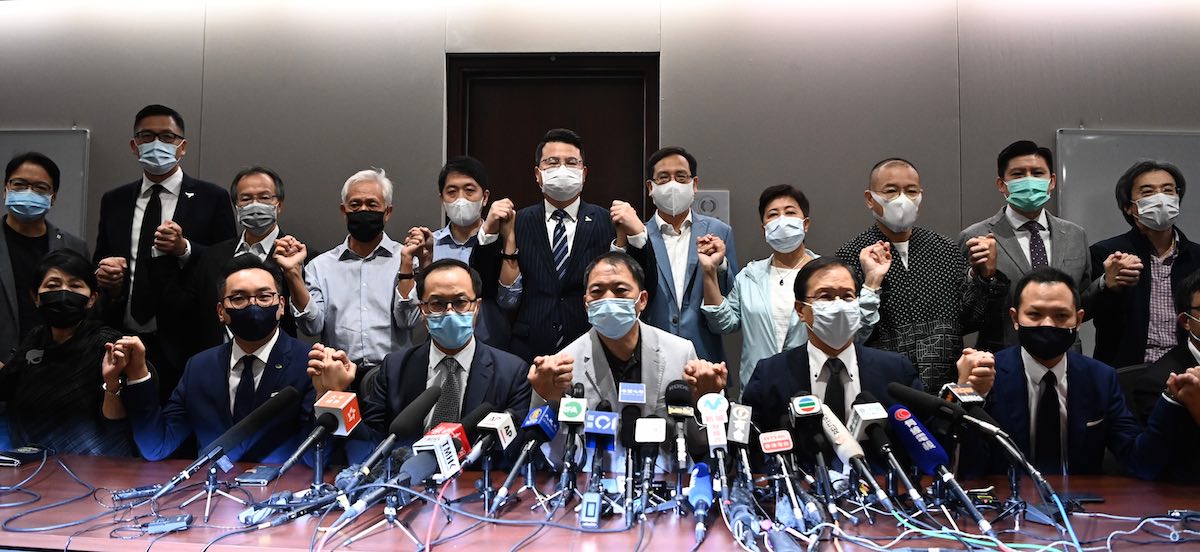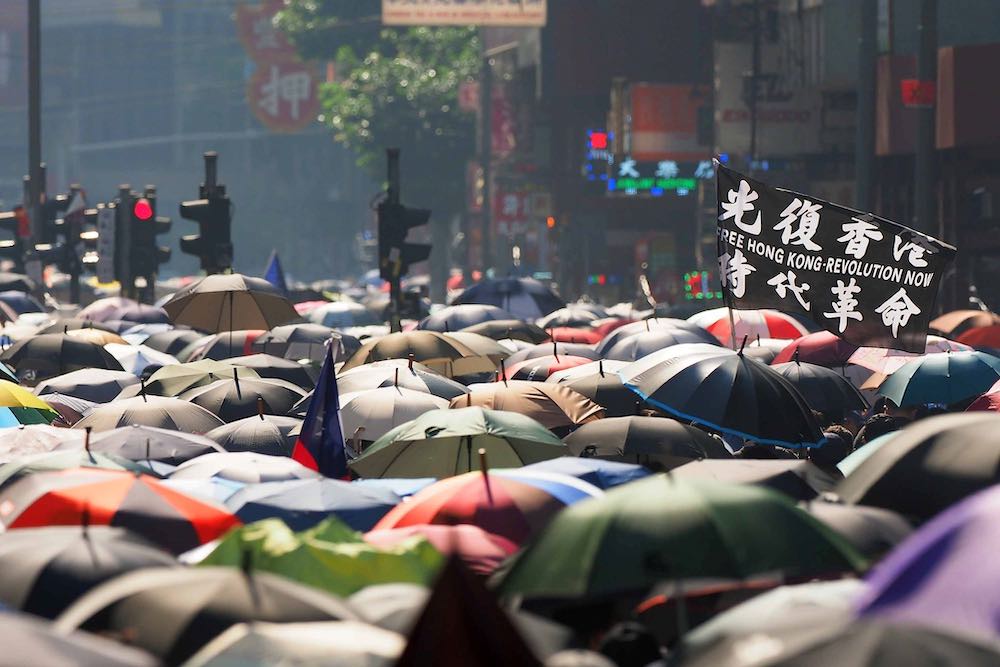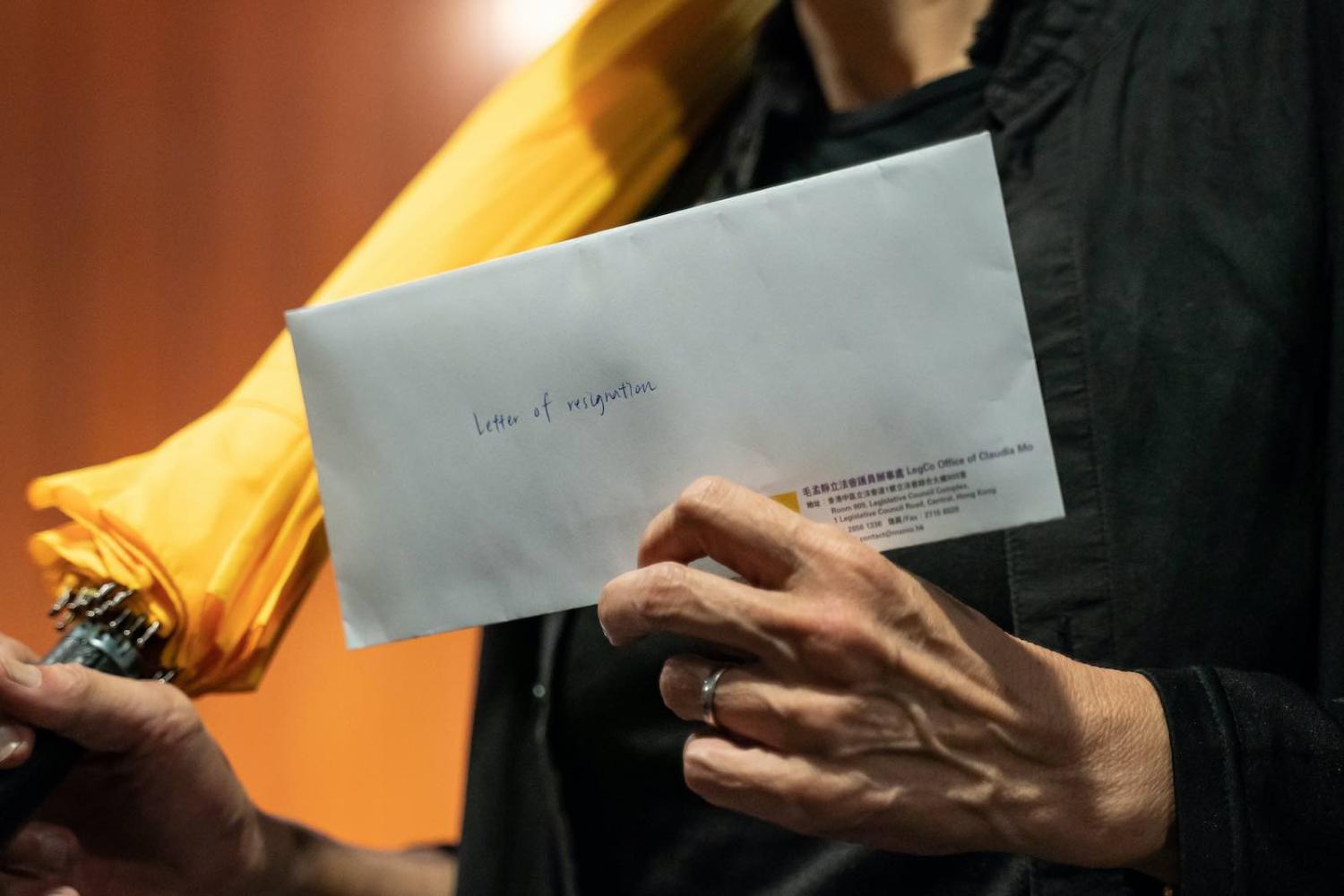For more than two decades, Hong Kong’s pro-democracy lawmakers played a game rigged against them. On 11 November, they had finally had enough.
“We are facing a totally new paradigm,” said Wu Chi-wai, head of the Democratic Party and convenor of the opposition camp. “We choose to stand with our colleagues who were disqualified. We will collectively resign.”
Hours earlier, China’s top lawmaking body – the National People’s Congress Standing Committee – had ousted four elected Hong Kong democrats on the grounds that they endangered national security, breached their oath of allegiance or refused to support China’s sovereignty over the city.
Hong Kong’s old-school opposition has conceded that changing the system from within – a mindset ingrained since the city’s return to Chinese rule in 1997 – was no longer possible.
For Beijing’s critics, it was the clearest sign yet that Hong Kong’s political institutions were defenceless against the will of the Chinese Communist Party. The disqualifications “show that the central government has completely abandoned the Basic Law and ‘One Country, Two Systems’,” Wu said in a press conference, referring to Hong Kong’s constitutional guarantee of autonomy.
Wu paints the mass resignation by 15 democrats as a gesture of solidarity and protest. But it was also, undeniably, an admission of defeat. Hong Kong’s old-school opposition (known as the pan-democrats) has conceded that changing the system from within – a mindset ingrained since the city’s return to Chinese rule in 1997 – was no longer possible.
Hong Kong’s Legislative Council has never been fully democratic: only 40 of its 70 seats are directly elected by one-person-one-vote, while the rest are allocated to different industries and sectors, which are mostly dominated by pro-Beijing business interests. This means that pro-democracy candidates have never held a majority, despite consistently winning around 60% of the vote in every election.
The pan-democrats were well aware of this structural unfairness, but for years that didn’t stop them from making electoral politics the core of their strategy. Seats in the legislature were considered too valuable to forfeit, even though the room for substantive opposition had been shrinking.

In 2016 and 2017, the Hong Kong government disqualified six pro-democracy lawmakers on the basis that they didn't properly take their oath of office. In hindsight, this was the beginning of the end. The pan-democrats lost their veto power, and their rivals seized the opportunity to effectively ban filibustering. That, in turn, sparked a chain reaction that placed tighter and tighter restrictions on parliamentary tactics.
By the time the 2019 protest movement came along, the pan-democrats in truth had very few tricks left up their sleeve. Aside from being regularly steamrolled by the pro-Beijing camp, they were also facing a crisis of relevance with their own base: younger, more radical activists accused the pan-democrats of only putting up token resistance in the legislative chamber, while clinging to a broken system out of inertia.
That debate resurfaced in July, when the Hong Kong government delayed the 2020 legislative elections by a year, citing public health concerns around Covid-19. Beijing had decreed that sitting lawmakers could remain in office in the meantime, but in the eyes of many Hongkongers, any politician who agreed to serve until 2021 was playing the game by Beijing’s rules. It became a question of complicity.
Sensing a split in public opinion, the pan-democrats said they would decide whether to stay or leave based on polling. But the results were inconclusive, so Wu in September argued in favour of continued participation. Street protests have shown that change doesn’t exclusively happen in the legislature, but someone still needs to hold down the fort and “relentlessly block all evil government policies”. It was a “multi-front battle”, he said at the time.
Merely six weeks later, Beijing denied Wu and his colleagues even that small measure of agency. With no opposition standing in the way, the Hong Kong government led by Chief Executive Carrie Lam is expected to rush through controversial legislative proposals, including a law to set up voting stations for Hong Kong elections in mainland China.

Many pan-democrats say they will continue to fight for their causes in civil society, although few offer concrete details. Fernando Cheung of the Labour Party, who has worked as a lawmaker for 12 years, said he was considering disbanding the party after it no longer had a foothold in the legislature. Others have vowed to work more closely with the “resistance bloc”, the ad-hoc label for activists who favour more confrontational tactics.
The biggest dilemma on the horizon is the 2021 legislative elections – assuming Beijing allows them to take place. If the pan-democrats decide to run again, they will likely be accused of opportunism and lose moral credibility. But if they recuse themselves, will the pro-democracy camp accept a legislature that is permanently without an opposition?
While much remains unclear, Beijing’s disqualification of the four lawmakers have brought about the end of an era: Hong Kong’s Legislative Council is no longer a viable space for meaningful resistance. For the pan-democrats, often faulted for lagging behind public sentiment, it was a moment of hard truths and disillusionment. They had loudly announced their intent to leave the dinner party – only to find out they were the last ones still there.

